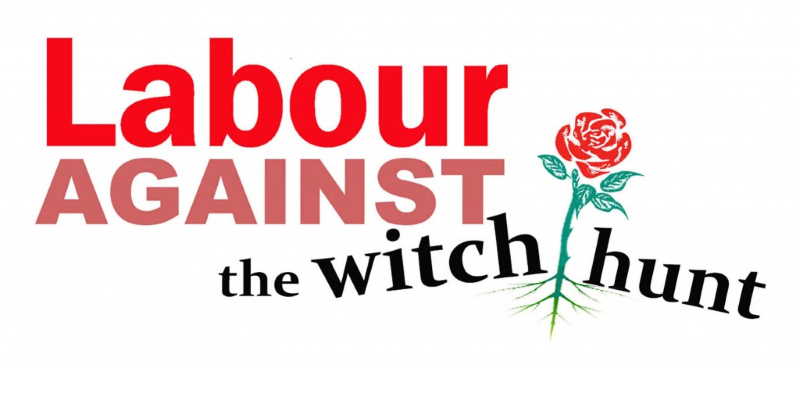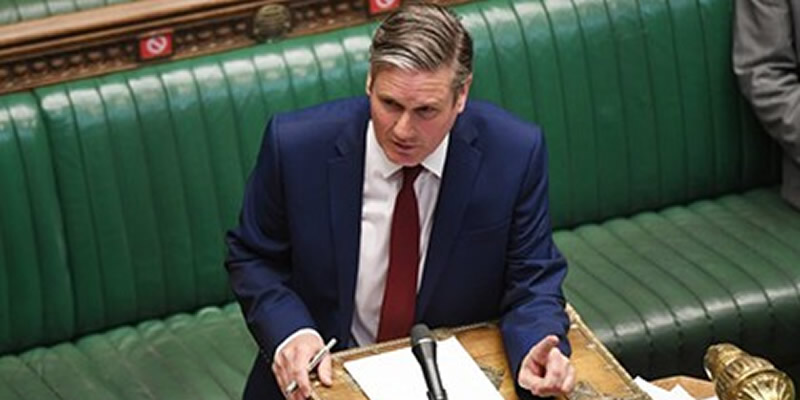Derek James argues that this is no time to give up on the fight against the witch-hunt. Nor will the attempt to form an amorphous socialist movement get anywhere
The decision to close down Labour Against the Witchhunt represents a step backwards in the fight against the Labour leadership’s attacks on party democracy and freedom of speech.
The proscribing of four organisations, the expulsion of long-standing leftwinger Graham Bash and the return of open Blairites to the shadow cabinet are just the most recent examples of how the right’s offensive is being intensified. Unfortunately, at a time when Keir Starmer and the party bureaucracy are stepping up their attacks on the left, the so-called merger of LAW and the Labour In Exile Network is likely to produce a total much less than the sum of its two parts. So, just when the need for a determined fightback by the left has never been greater, the possibility of it actually happening seems less likely!
The LAW all-members’ meeting on Saturday November 27 was presented with two sharply opposed motions that posed very different perspectives about the future direction of the campaign. The first, submitted by Tony Greenstein and Esther Giles, called for the merger of the two groups. It took as its starting point the argument made by Ken Loach that “democracy was dead in the Labour Party” and that there is now a political vacuum which presents the biggest challenge to the left in a generation. Quoting directly from comrade Loach, the motion said:
… we do need a new political movement, across the whole left, inside the Labour Party and outside; it’s got to be ready to become a party when the time is right … Otherwise we fragment … At this critical moment, when you have this mass of people just driven out of the party, where are they going to go? If we miss this opportunity, it is a very black outlook.
After calling for a merger – or a “consolidation”, as comrade Greenstein described it – the motion went on to define its strategy as one of working or joining forces with other “like-minded organisations, including the Labour Left Alliance, Labour Representation Committee, Resist and Defend the Left”. Significantly a section of the original motion was deleted. This would have committed the merged group to:
both fighting the witch-hunt in the Labour Party and the politics of Starmer and bringing together socialists both inside and outside the Labour Party to build a socialist movement [and seeking] to work with grassroots mass movements such as over climate change (XR) and racism (BLM).
It was deleted as a result of an amendment moved by a leading member of LIEN, Norman Thomas.
The second motion, moved by LPM supporters Stan Keable and Andrew Kirkland, opposed the merger of LAW and LIEN, and argued that the focus of our campaign should remain on Labour and not the formation of a new group outside the party. The motion located the witch-hunt and the continuing battle inside Labour in a wider political context, by arguing that “reasserting rightwing domination of the Labour Party is of great importance to the UK establishment in guaranteeing the loyalty of its alternative capitalist government to the US world hegemon and its ally, Israel”.
The motion rejected the view that the struggle against the Labour witch-hunt is over, and that LAW has outlived its usefulness. Comrades Keable and Kirkland believed that the merger of LAW and LIEN would not only liquidate LAW, but would add to the widespread demoralisation and disorientation that already exists on the Labour left. Far from giving up on this fight, the motion stated that LAW still has a specific job to do in fighting the ongoing witch-hunt.
Thus it outlined a concrete set of campaigning proposals, such as intervening in all layers of the Labour Party and continuing to campaign at a grassroots level: working to build opposition to bans and proscriptions in the trade unions; winning the Socialist Campaign Group of MPs, Momentum, the Campaign for Labour Party Democracy, etc to adopt a militant and unambiguous stance against the witch-hunt; deepening links with those outside the Labour Party who are being subjected to the bogus ‘anti-Zionism equals anti-Semitism’ smear campaign – pro-Palestine activists, academics, students, trade unionists, journalists, writers, artists, comics, film-makers, etc – and joining together with those internationally who are fighting back against the witch-hunt: eg, in the US, Germany, the Netherlands and France.
Consolidation?
Although both motions were moved, the meeting agreed by 49 to 41 to only vote on motion 1. Thus, if motion 1 was agreed, motion 2 would then automatically fall. In the event, it was indeed motion 1 favouring the merger that eventually passed with 47 votes in favour, 27 against and 12 recorded abstentions – although, with some 100 members present online, another 14 participants did not record a vote.
Both in moving the motion to merge and during the subsequent debate, the supporters of liquidating LAW argued that the current attacks on the left were “unprecedented” and that there was no real possibility of continuing the fight in Labour. Trade unions are breaking their links with the party and a slow “one-sided split” was underway. Comrade Greenstein said that there was little that LAW could do to resist the witch-hunt and that the immediate task was to build a socialist movement that could keep together the 150,000 party members who had left Labour since Starmer had become leader. In due course, when the time is right, he suggested, this would lead to the formation of a new party. But what sort of party and programme are we offered?
Here the real political weaknesses of the merger project were revealed. Although some of the comrades supporting this new initiative self-define as Marxists, all that they could offer us was yet another warmed-up halfway house or a Labour Party mark two. This oh-so-new project is in fact based on Labour’s 2017 and 2019 general election manifestoes, whose timid, managed capitalism is impossible to dignify even with the title ‘left reformism’, much less ‘socialism’. When the essentially pro-capitalist and pro-imperialist nature of these manifestoes was pointed out, all these comrades could do was to warn us not to scare the horses – the Labour left would be frightened off by too radical a project! Take it easy! Gently does it!
The transition towards socialist consciousness is a gradual one, we are told, showing that our rather Fabian Trotskyist comrades really lack confidence in winning the working class to the cause of socialist revolution. Instead, in this new organisation we can be sure that these ‘Marxists’ will hide their revolutionary light under a bushel and play the part of loyal Corbynites, whose only aim is to return to the glory days before the 2019 election defeat: no socialist politics or Marxist programme here, you understand; just an attempt to revive the Corbyn moment and its inchoate slogans, albeit this time sans Corbyn.
However, when reminded that the recent history of the left is littered with many such attempts to build broad fronts, such as the Scottish Socialist Party, Respect and Left Unity, and that all they produced were futile political cul-de-sacs, we are assured by these comrades that this time everything will be different. What justifies such confident hope after this often bitter story of the left’s political failure? Why, it is the experience of ‘the Corbyn movement’ itself and the belief that the missing 150,000 members can be quickly recalled to the colours by the new broad socialist movement that will emerge from the “consolidation” of LIEN and LAW.
While we wish the comrades well, it is not only past attempts to unite disparate elements in halfway-house projects that fail to inspire confidence about the future of this new initiative – which means, in effect, the absorption of LAW by LIEN. The plain fact is that the Corbyn moment has passed and no amount of ghost dancing is going to bring it back. The 150,000 lost members are not sitting around waiting for a call to arms to join a new initiative. They will not be so easily scooped up. Some have joined the numerous small groups outside the Labour Party, such as Chris Williamson’s Resist; others have turned their attention to renewed activity in the trade unions or thrown themselves into activism and protest politics, such as XR; while many more have simply given up – disillusioned by the dismal failure of the Labour left and its leaders.
Disgrace
The leaders of the official, licensed left in the Socialist Campaign Group of MPs and Momentum have compromised and surrendered to the Labour right all along the line. They are a disgrace, having squandered opportunity after opportunity to advance the politics of the left in the party. They have been prepared to throw good comrades under the bus and join in the attack, as socialist militants are smeared with false accusations of anti-Semitism.
The continued failure of Corbyn, McDonnell et al to rally the left in the face of the witch-hunt has only added to the demoralisation of the left, which is now in a full, disorganised retreat. Attendance at meetings has fallen dramatically and there is a widespread pessimism in many Constituency Labour Parties. Indeed, many left activists are keeping their heads down and their powder dry, hoping for better times ahead somewhere in the distant future, and only breaking cover to take part in Twitter storms and sporadic conference rebellions against the leadership.
In this period of defeat, it is essential to keep a cool, strategic head. Despair is no help whatsoever. If the comrades were proposing an organisation, a movement, which had half a chance of leading to a serious Marxist party, it would be another matter. Meanwhile, it is clear that the fight in the Labour Party is far from over. Like the trade unions it remains a vital site of struggle.
Despite the seriousness of the current witch-hunt and the dire position in which the left now finds itself, the present situation is part of a wider pattern. Just look at the history of recurring witch-hunts against the left from the 1920s onwards. Bans and proscriptions, expulsions and suspensions are nothing new.
Neither is the bourgeois nature of the party’s leadership and pro-capitalist right, irrespective of their individual social backgrounds. Who can tell me that trade union leaders turned Labour politicians like Jimmy Thomas and Ernie Bevin did not further the interests of capitalism within the workers’ movement? Many comrades in the 1990s argued that Tony Blair’s apparent total victory meant that Labour had become a completely bourgeois party. In the main the various halfway house projects and ‘new workers’ parties’ that developed in this period were predicated on that assessment, yet failed to break through – even when they watered down their ‘Marxism’ and presented themselves as the real inheritors of the ‘old Labour’ tradition.
The politics of the Labour leadership from the foundation of the party have always been bourgeois, in that they seek to integrate the working class into capitalism and the constitutional status quo. Given the party’s origins as a sectional representative of ‘labour’ and a party of the trade unions, which attempts to bargain with the ruling class, the development of this type of limited politics, focused on obtaining concessions within the framework of capitalism, was inevitable. The absorption of individual Labour leaders into the ruling class and the creation of Labour as an acceptable alternative party of government from the 1920s were simply a corollary of this structural process of incorporation.
Starmer and Blair are particularly egregious examples of this, but, in their acceptance of capitalism and the rules of the political game, they are just the same as earlier Labour leaders. Characterising the leaderships of Blair and Starmer as somehow uniquely ‘bourgeois’ not only obscures the historical nature of the Labour Party, but also sows illusions in those Labour leaders, like Jeremy Corbyn, who use left rhetoric to cover their compromises with capitalism.
However, whilst Labour retains the affiliation of significant trade unions, maintains an electoral base amongst working class voters and remains a potential focus for those who define themselves as socialists, it still can be seen as a bourgeois workers’ party. So, despite and perhaps because of the witch-hunt, Labour under Keir Starmer is far from dead: it remains a bourgeois workers’ party that the ruling class are determined to keep under their control and thus it is still an important site of struggle for socialists.
History repeating
Our critique of the as-yet-unnamed merger project is both political and strategic. The leadership of LIEN includes comrades who are uncritical supporters of Corbyn, do not understand his treacherous role and will not countenance a word said against him, whilst others who support the merger are openly and correctly critical of Corbyn’s surrender to the right during the witch-hunt. Hardly a recipe for harmony.
Likewise, there are similar political fault lines about the strategic direction of the new group. Whilst for many the merger is simply a case of huddling together in a cold and hostile political environment or continuing the headless-chicken ‘politics’ of ‘action, action, action’, others have a more clearly defined aim. Although it appears that, in arguing that the new initiative should work or join forces with other “like-minded organisations”, options are being kept open. In practice the general line of travel into a new broad-front grouping and political dead-end outside the Labour Party is clearly signposted. The two lines of ‘action’ and ‘fusion’ are, of course, not incompatible and can easily coexist and cooperate within one organisation for a certain period. But, taken as a whole, they do not make for long-term political coherence and a clear organisational strategy.
Our opposition to the liquidation of LAW and our call to keep its focus on Labour is not the result of any blind Labour loyalism or of clinging onto the routine certainties of party membership and activity. LPM recognises both the historical and contemporary place of the Labour Party in British society and working class politics. It also understands that this position is not immutably fixed for all time and that it could change in the future: like other social democratic parties in Europe, it could undergo a process of decline and Pasokification. The electoral collapse of Labour in Scotland and the undermining of the ‘red wall’ is a warning of how that might happen in Britain as a whole.
However, Labour is not dead yet. Just as the obituaries pronounced in the 1990s were proven to be premature by the unexpected development of the Corbyn movement and the growth of a mass left in the party, so the continued witch-hunt shows that for the ruling class and their collaborators on the Labour right the party remains too valuable a tool to be abandoned to the left and working class militants. If the ruling class thinks the battle is still worth fighting, then so must we.
LPM has a serious strategic orientation towards Labour. We call not for the abandonment of the party, but its refounding as a united front of a special kind, open to affiliation by all working class and socialist organisations. We recognise that Labour is not a ready-made instrument for achieving socialism: that requires a party armed with a Marxist programme of working class self-emancipation, as opposed to electoralism and participation in bourgeois governments. The development of such a party and such a programme is absolutely essential. This is not a Labour Party mark two, or a broad-left party with a Marxist vanguard.



